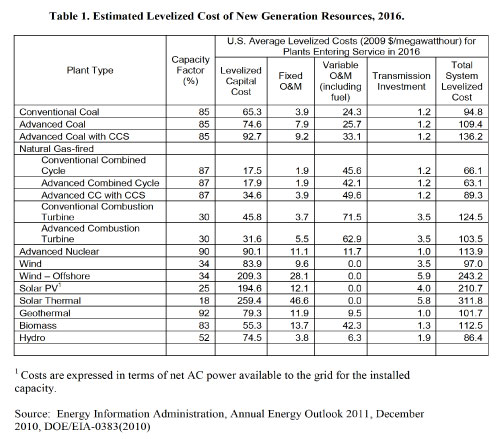From NCPA Nov 7, 2011
New York Times columnist Paul Krugman has a particularly silly column today in the Seattle Times, proclaiming “That’s right: Solar power is now cost-effective.” His central claim, after he finishes attacking natural gas exploration, is that “we’re just a few years from the point at which electricity from solar panels becomes cheaper than electricity generated by burning coal.”
He doesn’t provide a source for this dramatic claim, and with good reason: it simply isn’t true.
The best source for projections about costs of energy and technology is the Energy Information Administration (EIA). The EIA releases an annual estimate of future cost of energy production for a wide range of sources. In its report released in late 2010 on the “levelized cost of new generation” for the year 2016, the EIA includes this chart:

Solar energy, which the EIA notes as “Solar PV” for photovoltaic solar, has the third highest cost per megawatthour (MWh) of all new energy generation sources. As for Krugman’s claim that it is cheaper – or will soon be cheaper – than coal, it will be more than twice the cost of coal in 2016.
Krugman goes on to claim “if we priced coal-fired power right, taking into account the huge health and other costs it imposes, it’s likely that we would already have passed that tipping point.” Wrong again. The line listed as “Advanced Coal with CCS” represents new requirements to reduce traditional air pollution from coal and capture the carbon emitted – carbon capture and storage (CCS). Even under that scenario, solar is expected to cost 54% more than coal.
The cheapest source of energy is that which Krugman spends the first half of the article attacking: natural gas. It will be less than one-third the cost of solar in 2016. What’s more, natural gas releases half the amount of carbon of coal, meaning it is a good stepping stone to a carbon-reduced economy. This is exactly the strategy the UK used to meet their targets under the Kyoto Protocol. They went from an economy that was heavily coal-based to one that is now more reliant on natural gas.
These numbers are why those who care about reducing carbon emissions have shied away from recommending solar energy. A study by the McKinsey Company updated just last year that is widely cited in the environmental community (and sponsored by the Natural Resources Defense Council) puts solar energy toward the end of its list of dozens of policies that can reduce carbon.
Krugman claims the cost of solar is declining dramatically, implying that recent technology breakthroughs are driving cost reduction. In reality, the costs have come down for a very different reason: China. China has invested heavily in solar panel production, using its advantage in manufacturing costs and capacity to drive prices down. The largest irony here is that Krugman takes credit for China’s success to support solar panels even as he attacks China for its trade policy. Following his advice on China would actually increase the price of solar panels, undermining the general thrust of his claim about solar energy becoming more competitive.
Put simply, focusing on solar energy wastes money that could be better spent on dozens of other strategies.
Krugman, like many others, has fallen for trendy environmentalism, looking at policies that sound cool rather than looking at the data. In a column full of ironies, the largest irony is that following Krugman’s approach would waste money on policies that don’t work and miss opportunities to make real improvements in energy efficiency. That is the corrosive power of eco-fads at work.